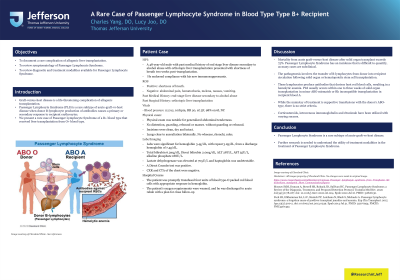Monday Poster Session
Category: Liver
P2989 - A Rare Case of Passenger Lymphocyte Syndrome in Blood Type B+ Recipient
Monday, October 28, 2024
10:30 AM - 4:00 PM ET
Location: Exhibit Hall E

Has Audio

Charles Yang, DO
Thomas Jefferson University
Cherry Hill, NJ
Presenting Author(s)
Charles Yang, DO, Lucy Joo, DO
Thomas Jefferson University, Cherry Hill, NJ
Introduction: Graft-versus-host disease is a life-threatening complication of allogenic transplantation. Passenger Lymphocyte Syndrome (PLS) is a rare subtype of acute-graft-vs-host disease when donor B-lymphocyte production of antibodies causes a primary or secondary response to recipient erythrocytes. We present a rare case of Passenger Lymphocyte Syndrome of a B+ blood type that received liver transplantation from O+ blood type.
Case Description/Methods: A 48-year-old male with past medical history of end stage liver disease secondary to alcohol abuse with orthotopic liver transplantation presented with shortness of breath. He endorsed compliance with his new immunosuppressants. Admission vitals were significant for blood pressure of 112/92, heart rate 101bpm, respiratory rate 20, oxygen saturation 98% on six liters of nasal cannula. Physical exam was notable for generalized abdominal tenderness without guarding or rebound. Incisions were clean, dry and intact. Labs were significant for hemoglobin 3.4g/dL, with repeat 3.2g/dL, from a discharge hemoglobin of 7.4g/dL. Total bilirubin 6.2mg/dL, Direct bilirubin 2.0mg/dL, ALT 28U/L, AST 35U/L, alkaline phosphate 188U/L. Lactate dehydrogenase was elevated at 705U/L and haptoglobin was undetectable. A direct Coombs test was positive. The patient was promptly transfused four units of blood type-O packed red blood cells with appropriate response in hemoglobin. The patient’s oxygen requirements were weaned, and he was discharged to acute rehab with a plan for close follow-up.
Discussion: Mortality from acute graft-versus-host disease after solid organ transplant exceeds 75%. Passenger Lymphocyte Syndrome has an incidence that is difficult to quantify, as many cases are subclinical. The pathogenesis involves the transfer of B-lymphocytes from donor into recipient circulation following solid organ or hematopoietic stem cell transplantation. These lymphocytes produce antibodies that destroy host red blood cells, resulting in a hemolytic anemia. PLS usually occurs within one to three weeks of solid organ transplantation in minor ABO mismatch or Rh incompatible transplantation in recipient blood A. While the mainstay of treatment is supportive transfusions with the donor’s ABO-type, there is no strict criteria. Corticosteroids, intravenous immunoglobulin and rituximab have been utilized with varying success. Further research is needed to understand the utility of these modalities in the treatment of Passenger Lymphocyte Syndrome.
Disclosures:
Charles Yang, DO, Lucy Joo, DO. P2989 - A Rare Case of Passenger Lymphocyte Syndrome in Blood Type B+ Recipient, ACG 2024 Annual Scientific Meeting Abstracts. Philadelphia, PA: American College of Gastroenterology.
Thomas Jefferson University, Cherry Hill, NJ
Introduction: Graft-versus-host disease is a life-threatening complication of allogenic transplantation. Passenger Lymphocyte Syndrome (PLS) is a rare subtype of acute-graft-vs-host disease when donor B-lymphocyte production of antibodies causes a primary or secondary response to recipient erythrocytes. We present a rare case of Passenger Lymphocyte Syndrome of a B+ blood type that received liver transplantation from O+ blood type.
Case Description/Methods: A 48-year-old male with past medical history of end stage liver disease secondary to alcohol abuse with orthotopic liver transplantation presented with shortness of breath. He endorsed compliance with his new immunosuppressants. Admission vitals were significant for blood pressure of 112/92, heart rate 101bpm, respiratory rate 20, oxygen saturation 98% on six liters of nasal cannula. Physical exam was notable for generalized abdominal tenderness without guarding or rebound. Incisions were clean, dry and intact. Labs were significant for hemoglobin 3.4g/dL, with repeat 3.2g/dL, from a discharge hemoglobin of 7.4g/dL. Total bilirubin 6.2mg/dL, Direct bilirubin 2.0mg/dL, ALT 28U/L, AST 35U/L, alkaline phosphate 188U/L. Lactate dehydrogenase was elevated at 705U/L and haptoglobin was undetectable. A direct Coombs test was positive. The patient was promptly transfused four units of blood type-O packed red blood cells with appropriate response in hemoglobin. The patient’s oxygen requirements were weaned, and he was discharged to acute rehab with a plan for close follow-up.
Discussion: Mortality from acute graft-versus-host disease after solid organ transplant exceeds 75%. Passenger Lymphocyte Syndrome has an incidence that is difficult to quantify, as many cases are subclinical. The pathogenesis involves the transfer of B-lymphocytes from donor into recipient circulation following solid organ or hematopoietic stem cell transplantation. These lymphocytes produce antibodies that destroy host red blood cells, resulting in a hemolytic anemia. PLS usually occurs within one to three weeks of solid organ transplantation in minor ABO mismatch or Rh incompatible transplantation in recipient blood A. While the mainstay of treatment is supportive transfusions with the donor’s ABO-type, there is no strict criteria. Corticosteroids, intravenous immunoglobulin and rituximab have been utilized with varying success. Further research is needed to understand the utility of these modalities in the treatment of Passenger Lymphocyte Syndrome.
Disclosures:
Charles Yang indicated no relevant financial relationships.
Lucy Joo indicated no relevant financial relationships.
Charles Yang, DO, Lucy Joo, DO. P2989 - A Rare Case of Passenger Lymphocyte Syndrome in Blood Type B+ Recipient, ACG 2024 Annual Scientific Meeting Abstracts. Philadelphia, PA: American College of Gastroenterology.
